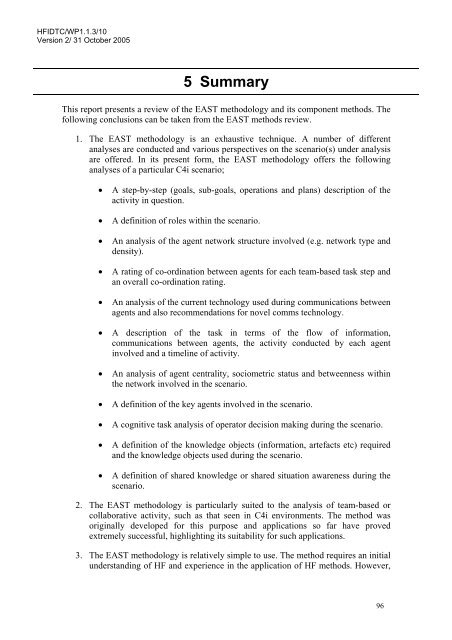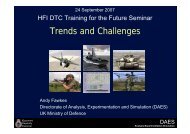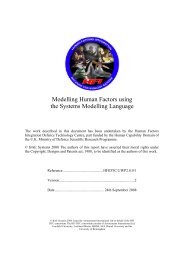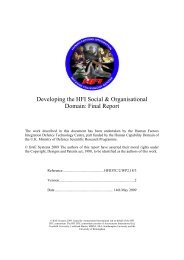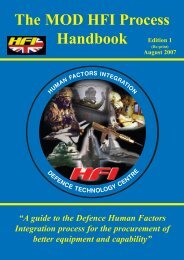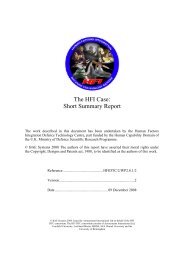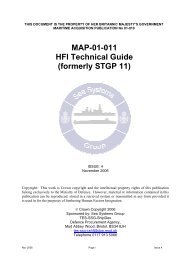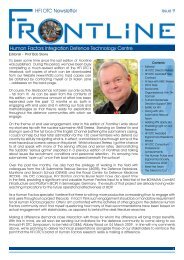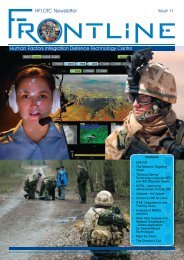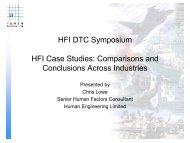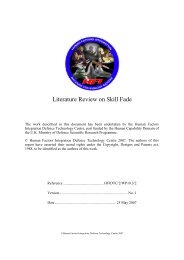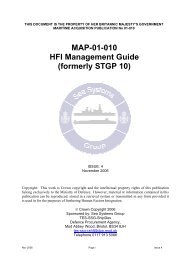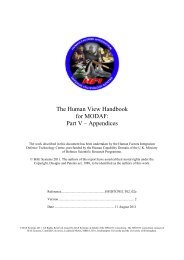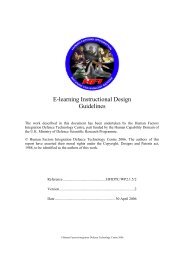A Review of the Event Analysis of Systemic Teamwork Methodology
A Review of the Event Analysis of Systemic Teamwork Methodology
A Review of the Event Analysis of Systemic Teamwork Methodology
- No tags were found...
Create successful ePaper yourself
Turn your PDF publications into a flip-book with our unique Google optimized e-Paper software.
HFIDTC/WP1.1.3/10<br />
Version 2/ 31 October 2005<br />
5 Summary<br />
This report presents a review <strong>of</strong> <strong>the</strong> EAST methodology and its component methods. The<br />
following conclusions can be taken from <strong>the</strong> EAST methods review.<br />
1. The EAST methodology is an exhaustive technique. A number <strong>of</strong> different<br />
analyses are conducted and various perspectives on <strong>the</strong> scenario(s) under analysis<br />
are <strong>of</strong>fered. In its present form, <strong>the</strong> EAST methodology <strong>of</strong>fers <strong>the</strong> following<br />
analyses <strong>of</strong> a particular C4i scenario;<br />
• A step-by-step (goals, sub-goals, operations and plans) description <strong>of</strong> <strong>the</strong><br />
activity in question.<br />
• A definition <strong>of</strong> roles within <strong>the</strong> scenario.<br />
• An analysis <strong>of</strong> <strong>the</strong> agent network structure involved (e.g. network type and<br />
density).<br />
• A rating <strong>of</strong> co-ordination between agents for each team-based task step and<br />
an overall co-ordination rating.<br />
• An analysis <strong>of</strong> <strong>the</strong> current technology used during communications between<br />
agents and also recommendations for novel comms technology.<br />
• A description <strong>of</strong> <strong>the</strong> task in terms <strong>of</strong> <strong>the</strong> flow <strong>of</strong> information,<br />
communications between agents, <strong>the</strong> activity conducted by each agent<br />
involved and a timeline <strong>of</strong> activity.<br />
• An analysis <strong>of</strong> agent centrality, sociometric status and betweenness within<br />
<strong>the</strong> network involved in <strong>the</strong> scenario.<br />
• A definition <strong>of</strong> <strong>the</strong> key agents involved in <strong>the</strong> scenario.<br />
• A cognitive task analysis <strong>of</strong> operator decision making during <strong>the</strong> scenario.<br />
• A definition <strong>of</strong> <strong>the</strong> knowledge objects (information, artefacts etc) required<br />
and <strong>the</strong> knowledge objects used during <strong>the</strong> scenario.<br />
• A definition <strong>of</strong> shared knowledge or shared situation awareness during <strong>the</strong><br />
scenario.<br />
2. The EAST methodology is particularly suited to <strong>the</strong> analysis <strong>of</strong> team-based or<br />
collaborative activity, such as that seen in C4i environments. The method was<br />
originally developed for this purpose and applications so far have proved<br />
extremely successful, highlighting its suitability for such applications.<br />
3. The EAST methodology is relatively simple to use. The method requires an initial<br />
understanding <strong>of</strong> HF and experience in <strong>the</strong> application <strong>of</strong> HF methods. However,<br />
96


